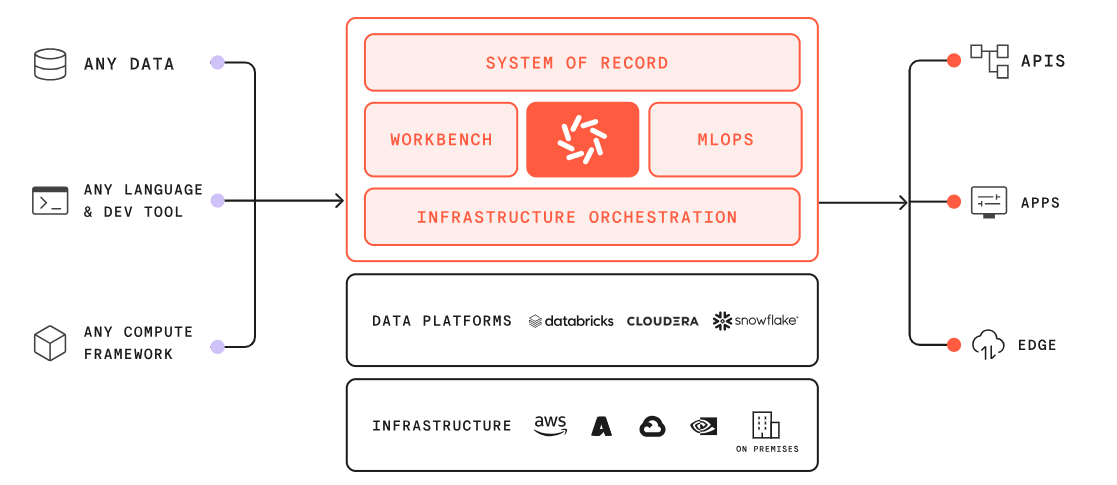Domino is an open platform for data science that unifies various programming languages, integrated development environments (IDEs), data sources, and tools in one location.
Domino provides a central hub for AI operations and knowledge across the enterprise, enabling best practices, cross-functional collaboration, faster innovation, and efficiency. This integration enhances the research, development, and deployment of data science and works well to:
-
Unify teams, tools, data, and infrastructure; and democratize all AI.
-
Orchestrate model life cycles and industrialize AI from pilot to scale.
-
Govern data, models, and processes to make AI responsible by default.
Domino makes it easier to use your favorite tools by setting up a few basic computing environments with partner technologies. We build and test these environments and run security checks to ensure they are safe.
Domino integrates seamlessly with your existing stack, allowing access to various open-source and commercial tools. Domino compounds knowledge, serving as a reliable source of organizational information and enhancing team collaboration.
-
Data Science teams: Domino is designed and optimized for unique and complex data science workflows. It gives you self-service access to data, tools, and infrastructure. You can reuse and collaborate with other teams and the business, enforce best practices, and compound knowledge and efficiency.
-
IT and DevOps teams: Domino has a secure, managed infrastructure with minimal IT support burden. The smart controls and full visibility allow you to slash cloud costs, and you can run Domino on any cloud, on-prem, hybrid, or multi-cloud environment.
-
MLOps and Risk teams: Domino allows you to track, review, and validate all models using robust processes. It also offers flexible deployment options within any environment and turnkey model monitoring with easy remediation. Automatic versioning of code, data, environments, and results and customizable templates for best practices make compliance easier to monitor.

Domino is an open system that provides self-service access to data and tools, enables the reuse of materials, and facilitates collaboration with other teams in your organization while enforcing best practices, enhancing knowledge, and improving efficiency.
-
Data: Domino connects to external data sources like databases, data warehouses, and data lakes. You can find a list of supported data sources under Data Source Connectors.
-
LLMs: Our deep learning models are trained on extensive datasets for language processing tasks. Based on their training data, they generate new text that mimics human language.
-
Software: You can connect your Domino projects to Jira, GitHub, MLflow, or Sagemaker. This enables seamless integration for your data science workflows and allows users to track progress on data science projects.
-
Languages: Domino allows data scientists to use their preferred languages and tools, such as Python, SAS, Matlab, and R.
-
IDEs and Tools: You can use IDEs and tools like Jupyter Notebook, JupyterLab, RStudio, VS Code, MATLAB, and SAS with Domino.
-
Packages and Libraries: We support a range of packages and libraries, including open-source options such as Python, R, TensorFlow, PyTorch, and others.
-
Compute Environments: You can add different environments to any Domino installation by visiting quay.io. To get started, download the image from the repository link. Our documentation has step-by-step instructions for setting up these environments.
We seamlessly integrate your data, infrastructure, and frameworks by employing diverse strategies and techniques. Additionally, we focus on creating comprehensive frameworks tailored to your specific needs, ensuring that your existing IT ecosystem functions cohesively and efficiently. Through these methods, we aim to optimize your operations and streamline workflows for improved performance and productivity:
-
APIs: Use Domino APIs to expand and facilitate innovation and efficiency.
-
Applications: Configure web applications to optimize scalability and performance for several popular frameworks.
-
Edge: Capture, process, store, and analyze data locally rather than fetching it from a distant server.
-
NetApp Volumes: Share data more easily across projects by storing files on external NetApp-backed storage.
-
External Data Volumes(EDVs): Volumes from network-attached storage systems that are mounted to the Domino system.
